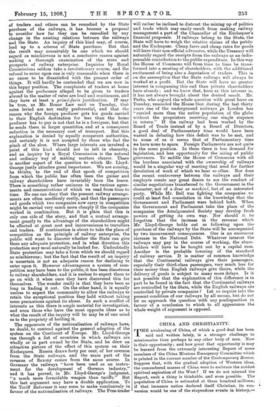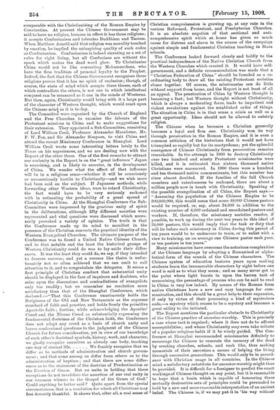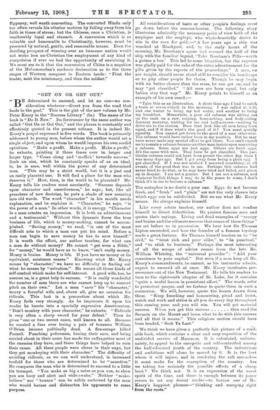CHINA AND CHRISTIANITY.
THE awakening of China, of which a good deal has been said and written lately, is a stronger challenge to missionaries than perhaps to any other body of men. Now is their opportunity ; and how great that opportunity is may be learned from the extremely interesting Report of some members of the China Missions Emergency Committee which is printed in the current number of the Contemporary Review. Suppose that, with the gradual adoption of Western ideas, the unnumbered masses of China were to embrace the noblest spiritual aspiration of the West ? If we do not misread the Report, such a thing is thinkable, and even possible. The population of China is estimated at three hundred millions; if that immense nation declared itself Christian, its con- version would be one of the stupendous events in history,—
comparable with the Christianising of the Roman Empire by Constantine. At present the Chinese Government may be said to have no religion, because in effect it has three religions ; it accepts Confucianism and tolerates Buddhism and Taoism. When Matthew Arnold said that religion was morality touched by emotion, he implied the uninspiring quality of such codes as Confucianism. Confucianism is indeed elevating as a set of rules for right living, but all Confucians are without the spark which makes the dead word glow. To Christianise China would not be like converting Mohammedans, who have the firm tradition of personal loyalty to the Prophet. Indeed, the fact that the Chinese Government recognises three religions proves that it has no spirit of exclusion; though, of course, the state of mind which accepts three theses, each of which contradicts the others, is not one in which intellectual conquest can be measured as it can in the minds of Westerns. But then, again, Christianity would bring with it a large part of the character of Western thought, which would react upon the Chinese mind as it is to-day. The Committee were organised by the Church of England and the Free Churches to examine the labours of the Protestant missions in China and to make suggestions for their extension. They appointed a Sub-Committee, consisting of Lord William Cecil, Professor Alexander Macalister, Mr. F. W. Fox, and Sir Alexander Simpson, to visit China and attend the recent Missionary Conference in Shanghai. Lord William Cecil wrote some interesting letters lately to the Times on his experiences, and we are dealing now with the Report of the other three. One of the first remarks to attract our curiosity in the Report is on the "great influence" Japan is exercising, and is likely to exercise, in the development of China. We wonder what the effect of that influence will be in a religious sense—whether it will be consciously or unconsciously hostile to Christianity—and we wish more had been said on the subject. If Japanese methods, while forwarding other Western ideas, were to retard Christianity, the fact would have to be very seriously reckoned with in estimating the probability of a great spread of Christianity in China. At the Shanghai Conference the Sub- Committee were impressed by the gracious unity of spirit in the deliberations, although fifty different societies were represented and vital questions were discussed which neces- sarily provoked a variety of opinion. The truth is that the Conference made up its mind to manifest in the presence of the Christian converts the practical identity of the Western Evangelical Churches. The ultimate purpose of the Conference was to found a United Native Chinese Church, and to that notable end the least the historical groups of Western Christianity could do was to lay aside their differ- ences. It was the least they could do, we say, if they intended to deserve success ; and yet a success like theirs is unfor- • tunately not so often achieved that we can omit to call attention to it, and to congratulate the delegates. It seems a first principle of Christian conduct that substantial unity should be displayed in the face of inquirers and doubters, who seize upon the dissensions and contradictions of evangelists only too readily ; but we remember no resolution more satisfactory than that of the Shanghai Conference, which declared :—" That this Conference unanimously holds the Scriptures of the Old and New Testaments as the supreme standard of faith and practice, and holds firmly the primitive Apostolic faith ; further, while acknowledging the Apostles' Creed and the Nicene Creed as substantially expressing the fundamental doctrines of the Christian faith, the Conference does not adopt any creed as a basis of church unity and leaves confessional questions to the judgment of the Chinese Church for future consideration, yet in view of our knowledge of each other's doctrinal symbols, history, work, and character, we gladly recognise ourselves as already one body, teaching one way of eternal life We frankly recognise that we differ as to methods of administration and church govern- ment ; and that some among us differ from others as to the administration of baptism ; and that there are some differ- ences as to the statement of the doctrine of Predestination or the Election of Grace. But we unite in holding that these exceptions do not invalidate the assertion of our real unity in our common witness to the Gospel of the Grace of God." Could anything be better said ? Quite apart from the special circumstances, that is a resolution for which all Christians may feel devoutly thankful. It shows that, after all, a real sense of Christian comprehension is growing up, at any rate in the various Reformed, Protestant, and Presbyterian Churches. It is an absolute negation of that sectional and anti- comprehensive spirit which at. home has given so much cause for distress and alarm in the course of the campaign against simple and fundamental Christian teaching in State schools.
The Conference looked forward clearly and boldly to the practical independence of the Native Christian Church from the Western Churches which created it. It would have self- government, and a definite recommendation was made that a "Christian Federation of China" should be founded as a co- ordinating body to draw all the existing Protestant societies closer together. Of course, the missionaries can do little without support from home, and the Report is not least of all an appeal. The penetration of China by Western thought is becoming a fact ; but Western thought without Christianity, which is always a moderating force, leads to impatient and violent revolutions against the established order of things. The situation in China is in that sense a crisis as well as a great opportunity. Ideas should not be allowed to outstrip religion.
The Chinese when he becomes a Christian generally becomes a loyal and firm one. Christianity won its way through persecution in the Roman Empire, and it is even a common criticism of the historians that it would not have triumphed so rapidly but for its martyrdoms; yet the splendid emergence of Chinese Christianity from persecution remains remarkable. In the attempt in 1900 to destroy Christianity over two hundred and ninety Protestant missionaries were killed, and it is estimated that sixteen thousand native Christians were massacred. In 1900 there were a hundred and ten thousand native communicants, but this number has since almost doubled. If the families of the full Church members and catechumens be reckoned, there are about a million people now in touch with Christianity. Speaking of the possible evangelisation of all China, the Report says :— " Assuming the population of the Chinese Empire to be 300,000,000, this would mean that some 40,000 Chinese pastors would be required, or, say, about 34,000 in addition to the existing number of 6,000 ordained and unordained pastors and workers. If, therefore, the missionary societies resolve, if possible, to work up during the next ten years to this ideal of 34,000 pastors, this would imply that the task or duty that will lie before each missionary in China during this period of ten years would be to endeavour to train, or to enlist with a view to training, on an average one Chinese pastor each year, or ten pastors in ten years."
Many missionaries have overcome the notorious complexities of the Chinese language by adopting a Romanised or alpha- betical form of the sounds of the Chinese characters. The Chinese system of education bestows years upon making students learn the innumerable characters by sight before one word is said as to what they mean ; and as many never get to the point where light bursts in upon the barren task of memorising, the percentage of persons who can be said to read in China is very low indeed. By means of the Roman form native Christians have a new and easy language for com- munication, and this should be a great help to their expansion, if only by virtue of their possessing a kind of mysterious code,—a mystery which ceases to be a mystery and becomes a great utility to the initiated.
The Report mentions the particular obstacle to Christianity of the Chinese practice of ancestor-worship. This is precisely a case where tact is required; where it does not do to affront susceptibilities; and where Christianity may even take tribute of a popular religious habit if it be wisely guided. The Con- ference at Shanghai recommended missionaries definitely to encourage the Chinese to venerate the memory of the dead by erecting churches, schools, and such like, thus making memorials of their ancestors a means of helping the living through successive generations. This would only be in accord- ance with Christian usage in all countries. In the Chinese mind a satisfactory substitute for ancestor-worship might thus be provided. It is difficult for a foreigner to predict the exact workings of Chinese thonght on any point, but it is reasonable to hope that a brain which is capable of honouring three mutually destructive sets of principles could be persuaded to hold by a new and more reasonable interpretation of an ancient belief. The Chinese is, if we may put it in 'his way withont flippancy, well worth converting. The converted Hindu only too often reveals his ulterior motives by falling away from his faith in times of stress; but the Chinese, once a Christian, is unalterably loyal and staunch. A conversion which is so valuable and honourable to Christianity, however, must be procured by natural, gentle, and reasonable means. Even the dazzling prospect of winning over an immense nation would not make less un-Christian the employment of any kind of compulsion if ever we had the opportunity of exercising it. We must see to it that the conversion of China is a negation of the Mohammedan's sardonic declaration as to the three stages of Western conquest in Eastern lands : "First the trader, next the missionary, and then the soldier."






































 Previous page
Previous page